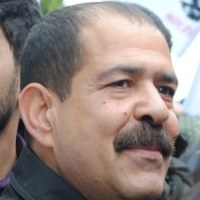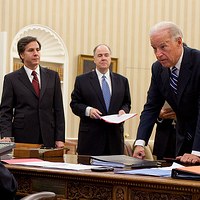![]()
Fri, Nov 11, 2011 | WikiLeaks | by Crethi Plethi

Libya’s National Transitional Council head Mustafa Abdul Jalil (R) is praying along with his Turkish Islamist counterpart Prime Minister Recep Tayyip Erdoğan (C) in Tripoli, sept 22, 2011.
WikiLeaks: Mustafa Abdul Jalil, an Islamist all along
Is Mustafa Abdul Jalil, head of Libya’s National Transitional Council and poised to lead the country’s transition from Qaddafi’s dictatorship to democracy, the right man for the job? The Obama administration may think he is the right man, but as it turns out, U.S. diplomats knew all along that Mustafa Abdul Jalil is an Islamist ‘reformer’ rather than a democratic reformer as two Cables reveal (from January/February 2010) released by WikiLeaks.
When Abdul Jalil talks about reforms, he is (and was) doing so with an Islamist agenda in mind. It is therefore no surprise that Mustafa Abdul Jalil, appointed in 2007 as Qaddafi’s “Minister of justice,” became the first member of Qaddafi’s cabinet to join the rebel movement in Benghazi. He resigned on 21 February 2011 after being sent to Benghazi to negotiate the release of hostages taken by Islamist rebels.
In his years as a judge, before his appointment as Qaddafi’s “Minister of justice,” Abdul Jalil was known for ruling consistently against Qaddafi’s regime:
He was among a handful of officials who were brought into the regime in the early-to-mid 2000s as part of an effort by Col. Gadhafi’s son, Saif al-Islam Gadhafi, to cast himself and the regime in a more reform-minded light.
In January 2010, Abdul Jalil appeared on national television, in front of Col. Qaddafi and hundreds of regime officials at an annual government conference, and declared his intent to resign frustrated by the government’s refusal to release [300 Islamist] political detainees. His resignation was rejected.
According to a february 2010 cable, Qaddafi stated that most of these 300 prisoners “are al Qaeda members, who killed Libyans,” proclaiming that “security is above all considerations.”
A December 2007 U.S. West Point Military Academy’s Combating Terrorism Center document showed that Eastern Libya had the greatest concentrations of jihadi terrorists to be found anywhere in the world and sent more fighters to Iraq’s Islamic militancy on a per-capita basis than any other Muslim country in the world, including Saudi Arabia. The Benghazi-Darnah-Tobruk region was regarded as the leading source of Jihadi-fighters to al-Qaida in Iraq. This fact is well known to Obama’s White House policymakers and Clinton’s State Department.
Mustafa Abdul Jalil was born in the city of Bayda, east Libya. Bayda is the fourth-largest city in Libya, located in the northern Cyrenaica, between Benghazi and Tobruk.
Benghazi was the first town in Libya’s rebellious east to rise up against Qaddafi’s army on February 17 and became the headquarters of the rebels during the eight-month war.
In a ceremony intended to mark the official end of the Qaddafi era (Oct 24, 2011), Abdul Jalil declared Islamic Law (Sharia) as the basic law in Libya, affirming that (Part 1, Article 1) “Islam is the Religion of the State, and the principal source of legislation is Islamic Jurisprudence”.
U.S. ambassador Gene Cretz notes in his january 2010 cable:
‘In the course of the discussion of the Criminal Code, Abduljalil abruptly changed the subject from freedom of speech to the “Libyan people’s concern about the U.S. government’s support for Israel.” He averred that Libya cares deeply about Muslims everywhere, and about Muslim countries. In his view, the root cause of terrorism stems from the perception that Europe and the U.S. are against Muslims.’
As an Islamist, Abdul Jalil’s motivation to change the subject stemmed from his inner belief in Islamic ‘higher moral standards’:
— hatred towards Israel
— Muslim Solidarity
— opposing Western ‘Christian’ imperialism
According to a Human Rights Watch report, Abdul Jalil’s drive to change the system [Qaddafi’s regime] is driven more by his conservative [Islamist] point of view rather than a reformist [democratic] agenda.
But it seems the Obama administration isn’t alarmed by the fact that Mustafa Abdul Jalil is an ‘Islamist’ reformer. Moreover, Obama is not alarmed at all now the ‘Islamist forces’ are stealing the revolutions in the Middle East. Now how many people in the Middle East will get killed in the future because of that?
Source: WikiLeaks
Reference Created Classification Origin 10TRIPOLI78 2010-01-27 15:12 CONFIDENTIAL Embassy Tripoli
VZCZCXRO9489
OO RUEHBC RUEHDBU RUEHDH RUEHFL RUEHKUK RUEHKW RUEHLA RUEHNP RUEHROV
RUEHSL RUEHSR
DE RUEHTRO #0078/01 0271512
ZNY CCCCC ZZH
O R 271512Z JAN 10
FM AMEMBASSY TRIPOLI
TO RUEHC/SECSTATE WASHDC IMMEDIATE 5739
INFO RUEHEE/ARAB LEAGUE COLLECTIVE
RUEHZL/EUROPEAN POLITICAL COLLECTIVE
RUCPDOC/DEPT OF COMMERCE WASHINGTON DC
RHMFISS/DEPT OF JUSTICE WASHINGTON DC
RHMFISS/CDR USAFRICOM STUTTGART GE
RUEAIIA/CIA WASHDC
RHEHAAA/NSC WASHINGTON DC
RUEHTRO/AMEMBASSY TRIPOLI 6293C O N F I D E N T I A L SECTION 01 OF 02 TRIPOLI 000078
SIPDIS
STATE FOR NEA/MAG. COMMERCE FOR NATE MASON.
E.O. 12958: DECL: 1/27/2020 TAGS: PGOV PREL PHUM EAID ECON CVIS PINR LY
SUBJECT: SENIOR LIBYAN JUSTICE OFFICIAL: LESS TALK, MORE ACTION IS BEST
TRIPOLI 00000078 001.2 OF 002
CLASSIFIED BY: Gene A. Cretz, Ambassador, U.S. Embassy Tripoli, Department of State. REASON: 1.4 (b), (d)
¶1. (C) Summary: Libya’s Justice Minister-equivalent, Mustafa Mohammad Abduljalil, told the Ambassador on January 25 that as Libya opens its economy to other countries, it needs international assistance in developing its private sector and strengthening the commercial legal environment. The Ambassador thanked Abduljalil for his support of the USG-funded Commercial Law Development Program’s (CLDP) work in Libya, including securing visas for the recent second visit to Libya of a U.S. federal judge and the CLDP program manager. Abduljalil said an upcoming February trip to the U.S. of three Libyan judges (at the invitation of CLDP) would provide the Libyans with new ideas and generate proposals for future cooperation. Abduljalil said Libya’s reform of its Criminal Code had moved to the General People’s Congress (Libya’s parliament-equivalent) for discussion. While Abduljalil has given the green light to his staff to work with us, he noted that many Libyans are still “concerned” about the USG’s support for Israel, and that terrorism stems from the perception that Europe and the U.S. are “against” Muslims. End Summary.
POSITIVE COOPERATION IN COMMERCIAL LAW PROGRAMS
¶2. (C) On January 25, the Ambassador (accompanied by econoff) met for the first time with Mustafa Mohammad Abduljalil, Secretary of the General People’s Committee for Justice (Minister of Justice-equivalent). The Ambassador stressed the importance of a sound commercial legal environment to Libya’s economic development. He noted that CLDP is an example of the type of bilateral program that can improve the legal environment, and thanked the Secretary for his help in obtaining Libyan visas for the U.S. participants of recent CLDP workshops. Abduljalil expressed his own support for the CLDP programs and bilateral cooperation in general, stating that “less talk and more action is best” when it comes to moving the relationship forward.
¶3. (C) The Ambassador previewed for Abduljalil the upcoming CLDP-sponsored trip to New York and Washington of three Libyan judicial officials. Abduljalil said that as Libya was now opening up its economy and developing a private sector, it needed to strengthen its commercial laws, and that such trips to the U.S. would provide the Libyans with new ideas. This was “essential” as, after many years of sanctions and international isolation, the Libyans know very little about the U.S. system of government. He said they were also interested in discussing a system for prisoner exchange to provide for the repatriation of Libyans imprisoned in the U.S. and for U.S. citizens in Libyan prisons. (Note: We are not aware of any Americans currently in Libyan prisons. End note.) He said Libya had negotiated such agreements with other countries and hoped to do the same with the U.S. He would ask the three officials to write a report after their upcoming trip, including proposals for other areas of cooperation.
STATUS OF LIBYA’S CRIMINAL LAW REFORM PROJECT
¶4. (C) Abduljalil said the GOL has been working on reforming Libya’s Criminal Code for 4-5 years and that the revised legislation is currently being discussed in the General People’s Congress. He noted that Libya is trying to incorporate alternatives to prison sentences for some crimes, including a system for imposing fines instead of jail-time, as well as community service. Ideally, the death penalty would be a sentence reserved only in cases of murder, he explained. Regarding other penalties, such as charges brought against those who speak against the government, Abduljalil maintained that Libyans could “say anything they wanted” in the forum of the General People’s Congress. He insisted that journalists were free to write anything they chose, provided they did not make personal accusations against anyone (i.e., slander).
FROM CRIMINALS TO ISRAEL: JUDGE ACCUSES U.S., EUROPE OF BEING AGAINST ISLAM
¶5. (C) In the course of the discussion of the Criminal Code, Abduljalil abruptly changed the subject from freedom of speech to the “Libyan people’s concern about the U.S. government’s support for Israel.” He averred that Libya cares deeply about Muslims everywhere, and about Muslim countries. In his view, the root cause of terrorism stems from the perception that Europe and the U.S. are against Muslims. He believed that “justice is for everyone,” and that if Libya does not uphold that tenet, then terrorists will find a foothold in Libya. The Ambassador replied that the U.S. is committed to a positive TRIPOLI 00000078 002.2 OF 002 relationship with the Muslim world, referencing the President’s 2009 speech in Cairo. He said it is important to continue the discussion of sensitive topics in order to develop a mature relationship between our two countries. Through the Human Rights Dialogue (HRD), the U.S. hopes to continue the discussion with Libya on such topics in a discreet, mutually respectful manner, which Abduljalil appeared to appreciate. The Ambassador gave Abduljalil a copy of the diplomatic note proposing the HRD working groups and invited his input.
BIO NOTE AND COMMENT
¶6. (C) Abduljalil was named Secretary of the General People’s Committee for Justice in January 2007. He does not speak English, and spoke only Arabic in our meeting. According to a recent report by Human Rights Watch (HRW), he has expressed reformist ideas about eliminating corruption within the GOL and bringing security organizations in line with the rule of law. In HRW’s assessment, Abduljalil’s drive to change the system is driven more by his conservative point of view rather than a reformist agenda. According to his staff and several judges, he is well-regarded and considered to be fair. The Ambassador’s initial meeting with Abduljalil was positive and encouraging. Through his staff, including Director of International Cooperation Kamal al-Bahri, Abduljalil has demonstrated an interest in working with us on the Commercial Law Development Program over the past year and a willingness to allow his staff to communicate with emboffs outside of official channels. This was evidenced by his securing visa approvals for visiting CLDP officials. (Note: His organization seems to have a parallel track in securing visa approvals, bypassing Protocol and the MFA, as the Embassy received the approval numbers for the CLDP visitors directly from the GPC for Justice and not through the MFA as usual; in fact, the visas for the two CLDP visitors are among the very few USG visas we have received in the past few months. End note.) The next step will be to continue the discussion of how we can work with the GPC for Justice in other, more sensitive areas, such as the Human Rights Dialogue. We also committed to providing the Minister with U.S. laws and explanations showing how we handled the issues of free association and free speech balanced against the security needs of the nation. End comment.
CRETZ
Source: WikiLeaks
Reference Created Classification Origin 10TRIPOLI99 2010-02-04 15:18 CONFIDENTIAL Embassy Tripoli
VZCZCXRO6275
OO RUEHDBU RUEHFL RUEHKW RUEHLA RUEHNP RUEHROV RUEHSL RUEHSR
DE RUEHTRO #0099 0351518
ZNY CCCCC ZZH
O R 041518Z FEB 10
FM AMEMBASSY TRIPOLI
TO RUEHC/SECSTATE WASHDC IMMEDIATE 5765
INFO RUEHXK/ARAB ISRAELI COLLECTIVE
RUEHZL/EUROPEAN POLITICAL COLLECTIVE
RHEHAAA/NSC WASHINGTON DC
RHMFISS/CDR USAFRICOM STUTTGART GE
RUEAIIA/CIA WASHDC
RUEHTRO/AMEMBASSY TRIPOLI 6321C O N F I D E N T I A L TRIPOLI 000099
SIPDIS
STATE FOR NEA/MAG
E.O. 12958: DECL: 2/4/2020
TAGS: PGOV PREL PHUM PINR LY
SUBJECT: MINISTER OF JUSTICE TRIES, AND FAILS, TO RESIGN
REF: A) 09 TRIPOLI 1021; B) 09 TRIPOLI 862
CLASSIFIED BY: Gene A. Cretz, Ambassador, U.S. Embassy Tripoli, Department of State. REASON: 1.4 (b), (d)
1.(C) Summary: Following his dramatic resignation before the General People’s Congress on January 28, Minister of Justice Mustafa Abduljalil appears to remain on the job. Sources in the Ministry of Justice said the resignation was not accepted and that plans are proceeding for Abduljalil’s official trip to Turkey in mid-February. Some observers believe that Muammar al-Qadhafi — who publicly rebuked Abduljalil — prefers to fire him on his own terms, while others believe Abduljalil’s backer Saif al-Islam al-Qadhafi will not let him resign. Abduljalil’s attempted resignation took place against the backdrop of a roiling political environment and could have implications for Libya’s criminal code reform efforts. End Summary.
2.(SBU) Libyan press reported January 28 that Minister of Justice Mustafa Abduljalil had submitted his resignation to the General People’s Congress (GPC, parliament-equivalent) due to his “inability to overcome the difficulties facing the judicial sector.” He cited the injustice of the Libyan government’s decision to keep 300 citizens in prisons, in spite of judicial rulings overturning previous convictions, while the GOL released convicted prisoners on death-row without informing the families of their victims, as required by Shari’a law.
3.(C) Initial local reaction to the news was mixed. Libyan leader Muammar al-Qadhafi, in his closing remarks to the annual GPC session answered Abduljalil’s accusations, stating that most of the 300 prisoners “are al Qaeda members, who killed Libyans,” and proclaiming that “security is above all considerations.” He declared Abduljalil’s statements to be out of place, proclaiming, “The Minister of Justice had the right to say what he said, but he should not have said it here.” Libyan observers speculated that Abduljalil’s resignation would not be accepted by the Libyan regime, which prefers to dismiss officials on its own terms. Human Rights Watch representatives, who praised Abduljalil for his work on Libya’s criminal code reform, worried that his departure would be a step backward for the justice system (Ref A). The Embassy’s local staff reports that citizens in Eastern Libya, particularly in Benghazi (a historically disenfranchised part of the country under the Qadhafi regime), where most of the families of the victims of the 1986 Abu Salim prison riots reside, were proud of Abduljalil for standing up to an unjust regime. These families reportedly protest regularly in the name of innocent prisoners still held at Abu Salim and other prisons that are controlled by the Libyan Internal Security Organization, outside the jurisdiction of the Ministry of Justice (MOJ).
4.(C) MOJ officials who have close working relationships with the Embassy refused to answer their phones from January 28 through February 1. On February 2, the MOJ Head of International Cooperation told Econoff that Abduljalil’s resignation was not accepted and that he remains in place. In fact, the Minister had been planning an official trip to Turkey in mid-February, and plans are moving ahead for that trip.
5.(C) One Libyan contact reported that Abduljalil, who is considered to be a fair-minded technocrat, was put in his position by Saif al-Islam al-Qadhafi and would not be able to leave the position without Saif’s blessing. The contact stated that “nobody, not Baghdadi (al-Baghdadi al-Mahmoudi, PM-equivalent) or Zwai (Mohamed Zwai, Secretary General of the GPC) can remove him from his position if Saif put him there.” He believed that only Saif or his father held the power to decide Abduljalil’s fate and that if they did want him to leave his position, the announcement would be made when the timing was best for them, such as after they had identified an acceptable alternative for the position. Pointing to National Oil Company Chairman Shukri Ghanem’s attempted resignation last October (Ref B), this contact said, “In Libya, he who puts you in has to take you out.”
6.(C) Comment: Abduljalil’s attempted resignation took place against the backdrop of political turmoil that has followed the October 2009 announcement of Muammar al-Qadhafi’s plans to appoint Saif al-Islam Qadhafi as “General Coordinator.” The complete absence of any discussion of the General Coordinator position at the January GPC furthered the growing uncertainty surrounding the Libyan political structure. This is likely not the final installment in Abduljalil’s political drama, and his attempted resignation could have implications for Libya’s criminal code reform efforts. End Comment.
CRETZ



 RSS
RSS











WikiLeaks: Mustafa Abdul Jalil, an Islamist all along | Middle East, Israel, Arab World, Southwest A http://t.co/zkMvIpUL
WikiLeaks: Mustafa Abdul Jalil, an Islamist all along | Middle East, Israel, Arab World, Southwest A http://t.co/zkMvIpUL
WikiLeaks: Mustafa Abdul Jalil, an Islamist all along – http://t.co/ZLzWoQm9
@electradiffusa @Jonny_Hallam http://t.co/el6mMw9d
WikiLeaks: Mustafa Abdul Jalil, an Islamist all along
@cachu
West Point Military Academy’s Eastern Libya greatest concentrations of terrorists
http://t.co/el6mMw9d